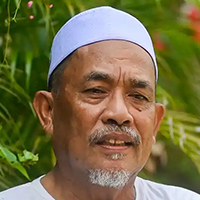
PETALING JAYA: At 47 years old, Ken Lee used to think he would be spending most of his free time winding down in his home near Bandar Bukit Puchong in Selangor.
Instead, the senior IT architect is responding to calls three times a week, requesting bee removal services from residential areas as far away as Seremban in Negeri Sembilan.
“There are typically two options when bees are in your home: you can either contact the firefighters, who will most likely torch the whole colony, or you can try to find someone who can rescue them,” he told FMT in conjunction with World Bee Day, today.
The father-of-five is among 250 volunteers involved with My Bee Savior, originally set up as an initiative by the Malaysian Agricultural Research and Development Institute (Mardi), but re-established in 2019 as an NGO.
“There were about five cases in which I managed to convince the callers to keep the bees. Otherwise, I will bring them back to my house.
“I now have five colonies of stingless bees and nine colonies of honeybees at home.

“I feel very proud to be able to save huge colonies of bees,” said Lee, adding that he joined the NGO in April 2023 after witnessing the “amazing” process of how bees were relocated from a neighbour’s home.
According to Greenpeace, bees are one of nature’s top pollinators, performing about 80% of all pollination worldwide and directly contributing to food security with the nutritious crops they sustain.
However, bee populations have been rapidly declining over the decades due to climate change, habitat loss, and the use of agrochemicals, particularly pesticides.
This is aligned with the United Nations’ (UN) finding that the extinction rates for pollinators are 100 to 1,000 times higher than normal due to human intervention.
In 2018, the US lost 40% of its honeybee colonies to a harsh winter, leaving the country with fewer than half the bees it had in the 1940s.
Not so dangerous

My Bee Savior chairman Norowi Hamid said the rescue missions are a way for the NGO to dismantle the misconception that bees are fearsome insects.
“Bees will not sting you if they are not disturbed,” he said.
In most cases, Norowi said, being stung by a bee would lead to redness and swelling of the skin. It only has the potential to become fatal if the person stung develops a severe allergic reaction.
As a biologist with around 40 years of research experience in the ecology of beneficial insects, Norowi said he was surprised and pleased to find that people other than scientists cared about bee conservation.

“Having teachers, engineers and accountants among the activists in My Bee Savior makes the mission fun and more exciting.
“Now our focus is on reaching out to others, especially the youth, and teaching them how to save bees.”
Norowi, a former director of Mardi’s biodiversity research centre, urged the government to implement the plan of action outlined in the UN Convention on Biological Diversity, ratified by all member states except the US.
Titled “The International Initiative for the Conservation and Sustainable Use of Pollinators”, the action plan for 2018-2030 encourages participating nations to implement pollinator-friendly practices in farms and research trends of pollinators. It also encourages engagement with stakeholders, especially farmers and educators, to raise awareness.
“The plan is already there, so it’s just the execution that’s lacking. That’s why we need policymakers to play their part,” said Norowi. - FMT



No comments:
Post a Comment
Note: Only a member of this blog may post a comment.